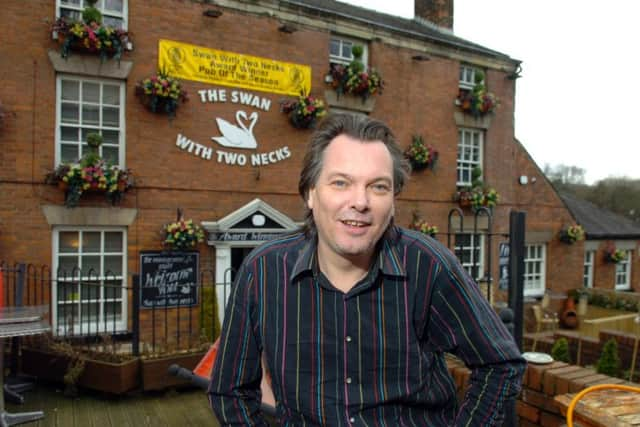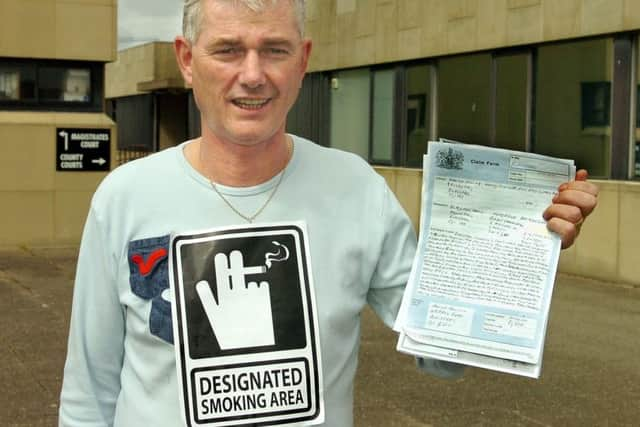Smoking ban saw a huge shift in our pub culture


But not everyone has welcomed the ban, which reaches its 10 anniversary tomorrow.
Almost 1,800 pubs have closed across the North West since the end of 2006, a new report has found. It has led to claims the ban has ‘damaged’ pubs and hurt local communities in the process.
Advertisement
Hide AdAdvertisement
Hide AdBut others say it has forced breweries and landlords to diversify, be more family-friendly, and said there are ‘several factors’ behind the closures.


Rob Lyons, author of the recent report looking into the impact the Smoke Free law has had, said: “The smoking ban has been a kick in the teeth for the traditional British boozer, especially in our urban inner cities. Ten years on from the introduction of this damaging policy, the government should order a full review of the impact of the legislation and consider alternatives to the current comprehensive ban.”
The report says more than 12,000 pubs have been lost since July 2007, with those in poorer urban areas suffering the most. It said that, while the decline is part of a long-term trend, and the smoking ban is not the only factor, there ‘was a clear acceleration in pub closures after it was introduced’, pro-smoking group Forest said. “There’s very little evidence that the health of the nation has benefit significantly from the smoking ban,” director Simon Clark said.
“Instead, thousands of pubs have closed and choice has been sacrificed on the altar of tobacco control. Allowing separate, well-ventilated smoking rooms or relaxing the unnecessarily strict regulations on outdoor smoking areas would reignite freedom of choice and give publicans greater control over their business. Attempts to extend the smoking ban to outdoor areas, including beer gardens, will be fiercely resisted. Smoking is a legitimate activity and pubs must be allowed to accommodate adults who wish to smoke.”
Advertisement
Hide AdAdvertisement
Hide AdIn May 2007, just weeks before the new Smoke Free law was brought in, a YouGov poll showed that one in four adults in England said they would visit pubs more often.


And Angela Aspin, regional director at CAMRA (Campaign for Real Ale), said the smoking ban cannot be blamed for all closures since, though she said it had ‘a role to play in all this’. She said: “Weak planning laws have made pubs an easy target for developers, with a loophole in the English planning system only being closed as recently as last month.
“A huge tax burden and changing business rates have also put a number of pubs under pressure, leading to soaring costs for consumers and ultimately less footfall.
“While the smoking ban has had a role to play in all of this, it’s difficult to determine the impact on its own. It’s likely to be a mixed story for pubs – while some may have lost core locals when the ban came in, others may have used the change to become accessible for other types of customers, much to their own profit.
Advertisement
Hide AdAdvertisement
Hide Ad“These days, we are seeing a number of pubs diversify their offering, such providing food, entertainment, games, or having family-friendly facilities. Sometimes this is to attract more customers, other times it’s because it’s the only community facility left in the local area. However, many pubs still continue to very successfully just offer good, quality beer. It’s very much down to the individual public to determine what’s best for them, but I think we could all agree that the image of pubs has changed dramatically in the last 10 years.”


What have readers said?
Karl Conlon-Parr described the day the new Smoke Free law came in as ‘fantastic’ and added: “I was able to go back into a pub without smelling like a dirty old tramp. No watery eyes, no cough, no smelly clothes and probably decreased my chances of developing a Roy Castle-type disease from second-hand smoke.
“The pubs became less busy because of big screen TV, Sky, cheap off-licence booze, and changing attitudes. Many pubs are busier with food and children.” In contrast, Nigel King said the ban ‘killed the pub trade’.
He said: “Older people just decided to stay at home. That was 50 per cent of the trade gone straight away.


Advertisement
Hide AdAdvertisement
Hide Ad“So pubs tried to turn into family pubs and do food, but were undercut by big chains who joined in.
“I remember when I was a kid – loads of pubs, and proper pubs. No food, just bingo and the odd group on at the weekend and you took the kids with you. Sadly a thing of the past now.”
Julie Williams said she ‘should be given a choice’, and added: “As a nonsmoker I’d rather have the choice of sitting in a smoky room full of people rather than sitting alone.
“I also worked behind a bar for 11 years when smoking was allowed in pubs, and it never bothered me at all.”
Advertisement
Hide AdAdvertisement
Hide AdAnd Claire Purcell added: “It made me quit and I could get a second wear out of my clothes because they didn’t stink.
“I also got fat because I could taste food again.”
Landlords who stood up to the ban
Nick Hogan hit the headlines in 2010 when he became the first – and to date the only – person to be jailed in connection with the smoking ban.
The libertarian, who ran the Swan with Two Necks in Chorley, was sentenced to six months behind bars for non-payment of fines he received for failing to honour the ban at one of his pubs in Bolton.
He was released just days into his sentence after a campaign was launched by his supporters and his fines were paid.
Advertisement
Hide AdAdvertisement
Hide AdNow 50 and back working in construction, Mr Hogan remains as outspoken as ever, branding the ban an attack on the working class.
The former UKIP candidate said: “What were Gordon Brown, Tony Blair, and [then health secretary] Alan Johnson doing sat in government picking on working class people in pubs having a cigarette, and not watching the banks bankrupt the country?
“They were not doing their job. They were picking on an easy target.”
When asked if he still feels as strongly about the ban as he did a decade ago, Mr Hogan said ‘very much so’, and said his fears about the impact it would have on pubs have been realised.
Advertisement
Hide AdAdvertisement
Hide AdHe described the 2007 legislation as a ‘hate crime against people who smoke’ and said licensed, well-ventilated indoor smoking rooms could still be introduced.
“It’s becoming a nanny state,” he added. “And that’s not the government’s job. We want less interference, not more.
“I don’t regret anything other than the way I went about it. It was probably naive. We were making fun of the government and asking if they were being stupid.
“My fate was sealed the day I decided I was going to protest against the ban. They were hell bent on shutting me down and they sent me down for six months.
Advertisement
Hide AdAdvertisement
Hide Ad“I got out after 12 days. I could have got out after 11 but I asked to stay in another night because – and I was in a high security prison – I got out on National No Smoking Day.”
He continued: “I have had nothing but support. The pub raised £11,500 to get me out – how much support do you need? It was from all over the world.”
Another Lancashire smoking rebel Hamish Howitt ended up in court after leading a long-running battle against the smoking ban.
He was unsuccessful in his bid to allow smoking in his bar after branding the legislation a ‘breach of liberty’.
Advertisement
Hide AdAdvertisement
Hide AdMr Howitt, 65, who flouted the ban at his DelBoy’s Sports Bar on Rigby Road, Blackpool, for 18 months, racking up many court appearances and thousands of pounds, later said it had ‘already killed off the pub trade’.
He said: “This blanket ban has destroyed the industry. If I’ve got 20 people standing outside my pub in the winter, freezing – those people are subsidising the heating and electricity inside the pub.”
The controversial publican used the pub – part of his Happy Scot’s complex – as the base for his campaign against the smoking ban, with his licence later being revoked by the council.
In 2009, three months after winning a £30,000 High Court battle, council chiefs handed a permanent licence back to the venue.